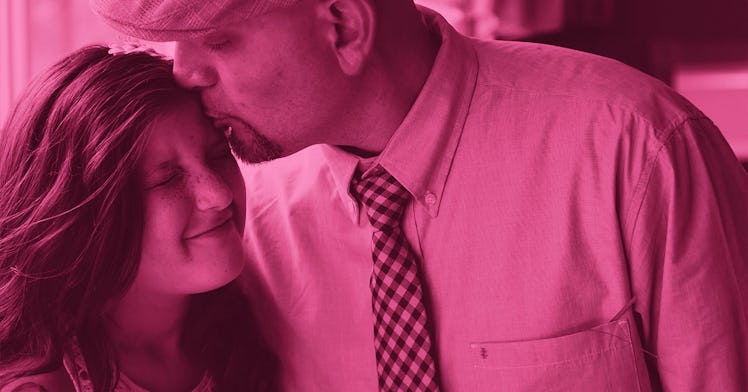Why Hero Dads Become an Embarrassment Over Night
And it has (almost) nothing to do with your behavior.

Embarrassment blossoms at the drop-off curb of every middle school in America. In that no man’s land between home and school, a kid is forced to reconcile perceived–and probably imagined–social pressures with the need to reassure and be reassured by a parent reluctant to put their Civic back in gear. Fathers and mothers, once heroes to their daughters and sons, suddenly find themselves scorned by eye-rolling pre-shavers. It’s a confusing and sudden emotional twist that inevitably leads to misunderstandings and often to confrontation. It is also an inevitability.
“Adolescence begins with loss,” says Carl Pickhardt, psychologist and author of the book The Connected Father. “We lose that adoring and adorable child. And we’ll never have that little person that way again. What they lose is this perfectly idealized, wonderful parent.”
The delta between perfection and reality is, as anyone who’s ever had a social interaction knows, where embarrassment breeds. Pickhardt explains that children’s exasperated sighs are squeezed from them by a natural shift in attitudes that occurs between the ages of 9 and 13. As children become more independent, they reject both the strictures and support of their parents in an attempt to forge a unique identity. This results in predictable and occasionally hurtful overcompensation.
“Being with us no longer fits if children are going to accomplish the two major goals of adolescence,” says Pickhardt. That’s particularly because those two goals, “getting enough detachment so they finally form a functional independence and getting enough differentiation so they end up with a fitting individual identity,” take an immense amount of work.
That’s especially true because adolescent identity is as much about acceptance in a peer group as it is about individual expression. And finding peer acceptance requires a deep understanding of the social norms. Interestingly (and perhaps not coincidentally) this is the same requirement for the ability to feel embarrassment.
“Until you know what the rules are it’s hard to be embarrassed about something,” says Dr. Skyler Hawk, who researches emotions and adolescence at the Chinese University of Hong Kong. “Adolescents are hyper-attuned to social norms. They’re on constant look-out for social norm violations by themselves or by other people.”
The problem is that while adolescents are attuned to social norms, they are also incredibly egocentric, unsophisticated about parsing the ones they observe, and ready to act at the whim of an imagined audience. “They fail to realize that everyone else in that middle school is thinking the same thing,” says Hawk. “They all think everybody is looking at them instead of other people.”
And that’s why the middle school drop off is such a fraught endeavor. A kid trying to become an individual is being stymied by their father or mother, who wants them to remain the same sweet kid. Outside, an imagined audience of peers watches attentively as the kid breaks social norms by expressing exasperation with an adult. “What an individual!” the members of this imagined audience remark as eyes roll and faces flush. The whole social setup is inherently ridiculous, but Pickhardt says it’s important to take it seriously regardless.
“You don’t want to trivialize embarrassment. It’s very very serious,” says Pickhardt. “It’s not far from humiliation and that’s not far from shame.”
He suggests that parents should take pains to pick up on the cues and make behavioral changes to minimize their childrens’ embarrassment. It’s an act of painful parental selflessness, but neither the first nor last one.
“It’s not a connecting experience,” Pickhardt reminds parents. “It’s more of an alienating experience.”
According to Pickhardt, parents should brake for embarrassment because adolescence will create inevitable separation. Parents can’t out-think hormones or developmental psychology. Embarrassment is a symptom and the disease of growing up. So, in order to hold on to any meaningful connection, parents should avoid complaining, or making fun of embarrassed kids even if they are behaving in absurd ways.
“Parents need to be door openers,” says Pickhardt. “They need to find new ways to be with their kid.” And if that means holding a hug for an appropriate time, away from the perceived prying eyes of peers, then it’s time to suck it up and know it’s for the greater good.
This article was originally published on